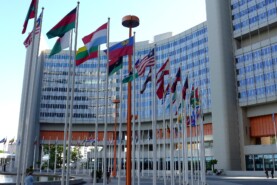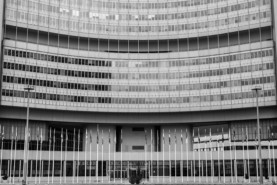Posted on 08 Jun 2023
The 32nd meeting of the UN Commission on Crime Prevention and Criminal Justice (CCPCJ) took place 22–26 May 2023 in Vienna. As has become the trend in recent years, geopolitics overshadowed proceedings at the session, which is supposed to be technical and consensus-based.
Two years ago, the CCPCJ was disrupted by a political dispute between Armenia and Azerbaijan, and last year the Russian invasion of Ukraine and the issue of civil society access highlighted political tensions. Other UN crime-related related meetings. including the 2022 Commission on Narcotic Drugs, saw acrimonious scenes in the context of the Ukraine war, while the UNTOC Conference of Parties in 2022 was divisive on civil society access. The ongoing process at the UN to negotiate a treaty on cybercrime has similarly been dominated by geopolitical polarization.
In this context, it was not surprising that this year’s session of the CCPCJ would be similarly fraught, especially when one of the resolutions (on trafficking in persons) was tabled by Belarus.
Belarusian text survives through threats to Canadian resolution
Following initial refusal by the EU, US, UK and other Western countries to engage on Belarus’s resolution, and calls for Belarus to withdraw it due to its role in the invasion of Ukraine, the resolution was eventually adopted in tandem with a resolution tabled by Canada on access to justice – the theme of this year’s CCPCJ. On the session’s opening day, the Swedish state secretary to the justice minister delivered an explosive statement on behalf of the EU denouncing Belarus’s involvement in and support for the Russian invasion of Ukraine, including its alleged complicity in the illegal transfer by Russia of Ukrainian children into Ukraine, citing the ICC arrest warrant for Putin. This set the scene for the Western group to refuse to engage, even though the resolution text was largely in line with Western views on responses to trafficking in persons. Indeed Belarus has long taken a leading role in tabling a resolution on trafficking in persons at the CCPCJ, which has in the past been adopted by consensus.
Throughout the session, as Belarus developed the text in negotiation without the major Western states, it became clear that their refusal to engage had provoked Russia and others to adopt a tit-for-tat stance against the Western grouping by editing, and effectively damaging, the Canadian resolution on access to justice, which in effect became hostage to the Belarusian resolution. Later, the West had stopped calling for the resolution to be withdrawn and started to engage on the Belarusian text. Iranian negotiators were also particularly active, as they have been in recent years, in attacking Western priorities in both texts on issues such as gender, human rights and the participation of non-governmental stakeholders.
On the substance, aside from predictable debates on the inclusion of references to human rights, there was heated discussion on whether to use the term ‘victims’ or ‘survivors’ of trafficking, which was supported by the US and other countries, but strongly opposed by Russia and Iran. Iran objected to the term ‘gender’, preferring the word ‘sex’, justifying this by arguing that certain gendered connotations are inappropriate for Iranian society. Some countries suggested encouraging multi-stakeholders to participate in efforts to provide data on trafficking in persons issues while other countries, led by Iran and others, wanted to water that language down.
Despite the differences, the text was eventually adopted, in parallel with the Canadian resolution, after the meeting was supposed to have closed.
Access to justice?
The resolution tabled by Canada, and co-sponsored by Chile and Peru, focused on the theme of this year’s CCPCJ: equal access to justice for all. The resolution follows up on the commitment undertaken by member states in the Kyoto Declaration to contribute to realizing the 2030 Agenda through efforts in crime prevention and criminal justice. The adopted text recognizes the links between access to justice and the sustainable development goals (in particular SDG16), the role of the CCPCJ, and the importance of technical assistance and capacity-building for member states.
Due to the Russian/Belarusian tactics, member states debated in detail the language of the Canadian resolution, with Russia and Iran being the most visible spoilers to reaching an agreement. Iran tried to include a reference to the impact of ‘unliteral coercive measures’, or sanctions, on providing access to justice services The irreconcilable differences led negotiators to opt for neutral and agreed-upon language, avoiding more progressive references to victims and survivors of crime, and gender. In the end, neither gender identities nor indigenous peoples were included in the paragraph that recognizes the importance of those in vulnerable situations.
The Canada resolution serves as an important reminder of the need for improvement in the areas of access to justice. It underscores the importance of multi-stakeholder participation in developing measures to reduce inequalities in the criminal justice system, and includes language on non-discrimination. A particularly welcome section recognizes the International Independent Expert Mechanism to Advance Racial Justice and Equality in Law Enforcement, advocating the need to ensure equal access for Africans and people of African descent, who are disproportionately subject to use of force and human rights violations.
Terrorism prevention
The resolution tabled by Austria , Chile, Indonesia and Italy on technical assistance related to counterterrorism similarly split the Committee of the Whole, although to a lesser extent than Canada’s resolution.
The first debate centred on a clause on non-intervention in the domestic affairs of other states. Here the major dispute was again between Western states and Iran. The Western group called for agreed-upon language, while Russia, Iran and Armenia, for example, favoured non-interventionist language.
An equally heated debate arose around the role of the UNODC and states to promote gender and human rights. Western states argued for a combination of gender and/or human rights while Iran and others wanted to return to language from a previous resolution. The clause that was ultimately agreed to was to ‘… promote the integration of the rule of law, human rights and gender equality’.
Other resolutions managed to escape unscathed by the geopolitical wars of words. The most notable was the resolution tabled by Japan, which confirmed that the United Arab Emirates will act as the host for the next UN Crime Congress in 2026, while also reaffirming some of the key organizational modalities for that meeting – including the central role of non-governmental experts in the Congress. Japan tabled another resolution on reducing reoffending, which was adopted without much debate. Ghana has been increasingly active in the multilateral forums in Vienna, and is expected to become Chair of the CND in 2023 for its high-level mid-term review of international drug policy. Confirming their commitment to engagement on these issues – Ghana tabled a resolution on the contribution of the CCPCJ to Agenda 2030, which was passed.
Despite protracted negotiations and domination of the talks by a small group of countries, this year’s CCPCJ did eventually adopt all tabled resolutions, including an important resolution on access to justice. It was also free of the voting, withdrawals and walkouts of recent UN meetings. However, the extent to which global political alignments dominated proceedings was still notable – as was the dominance over proceedings by countries supposedly suffering international isolation and with highly questionable records on access to justice. As the diplomatic community in Vienna prepares for ongoing discussions on the so-called cyber treaty, and for the next Crime Congress, this session served as a reminder of the fragility of consensus-based decision making on these topics, and how much-needed debate and discussion can be derailed to serve the needs of those who want to hold back progress.
Access to justice is particularly relevant for the Global Initiative Against Transnational Organized Crime at the moment. The GI-TOC appeals to the Algerian judicial system to expedite and conclude the criminal case against its senior analyst Raouf Farrah, 100 days since his imprisonment at the Boussouf detention facility in Constantine, Algeria.
#FreeRaoufFarrah



